Developing Therapeutic Alliances: Use of Self and Communication
VerifiedAdded on 2022/08/26
|7
|1303
|31
Essay
AI Summary
This essay delves into the concept of therapeutic use of self, highlighting the importance of the therapeutic alliance between therapists and patients for achieving desired outcomes in psychological therapy. It examines the key elements of a therapeutic alliance, including the development of personal bonds, agreement on treatment goals and tasks, and the use of effective communication skills. The essay emphasizes the significance of both verbal and non-verbal communication, such as greeting patients by name, active listening, and maintaining a positive body posture. It also explores the application of motivational interviewing (MI) techniques, including collaboration, evoking ideas, promoting autonomy, and the principles of empathy and self-efficacy. The essay underscores the role of communication skills and MI in forming therapeutic alliances, fostering trust, and facilitating effective problem-solving, and concludes by stressing the need for therapists to develop and sustain these skills in their clinical practice to build strong relationships with patients and to ensure positive treatment outcomes.
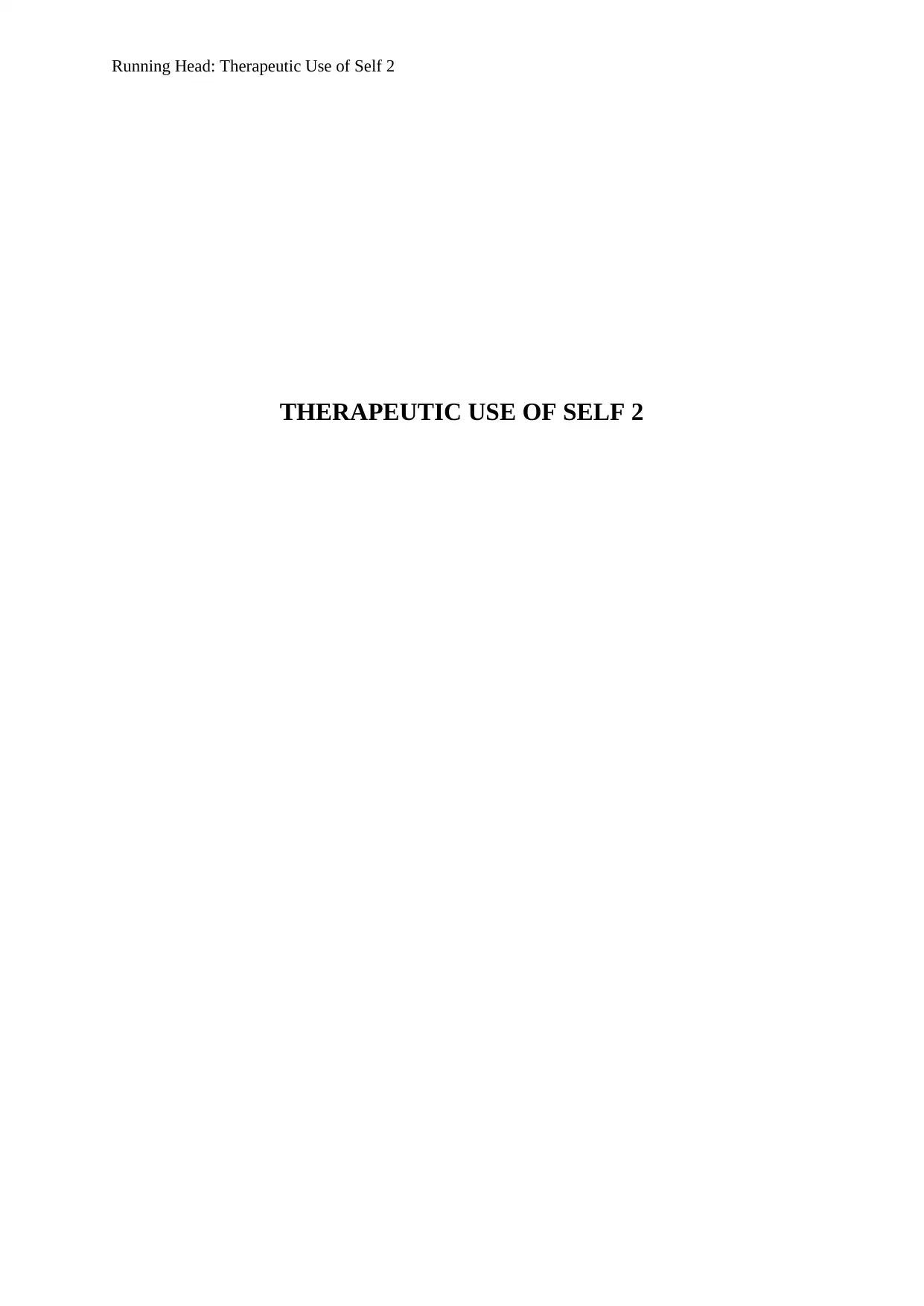
Running Head: Therapeutic Use of Self 2
THERAPEUTIC USE OF SELF 2
THERAPEUTIC USE OF SELF 2
Paraphrase This Document
Need a fresh take? Get an instant paraphrase of this document with our AI Paraphraser
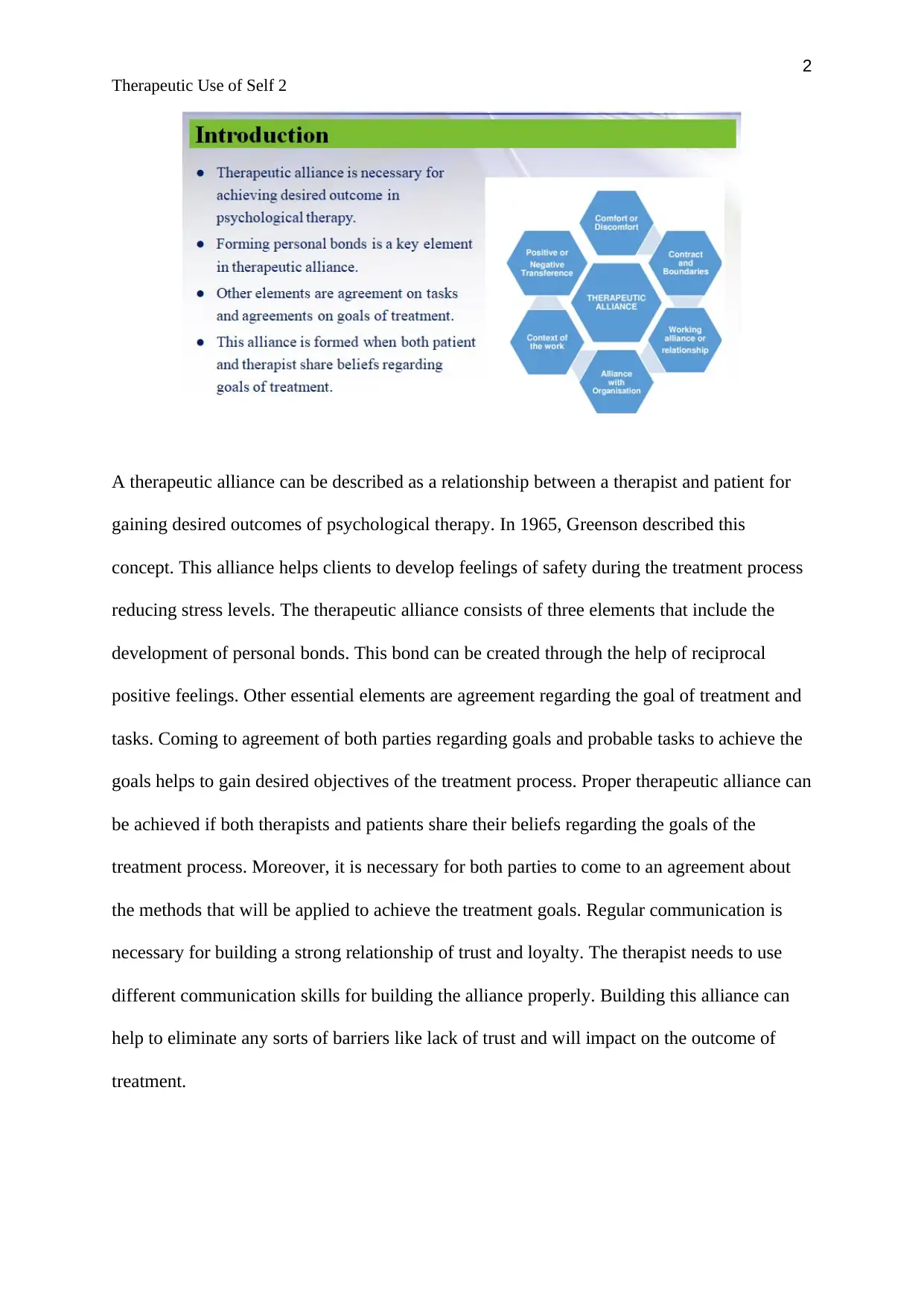
2
Therapeutic Use of Self 2
A therapeutic alliance can be described as a relationship between a therapist and patient for
gaining desired outcomes of psychological therapy. In 1965, Greenson described this
concept. This alliance helps clients to develop feelings of safety during the treatment process
reducing stress levels. The therapeutic alliance consists of three elements that include the
development of personal bonds. This bond can be created through the help of reciprocal
positive feelings. Other essential elements are agreement regarding the goal of treatment and
tasks. Coming to agreement of both parties regarding goals and probable tasks to achieve the
goals helps to gain desired objectives of the treatment process. Proper therapeutic alliance can
be achieved if both therapists and patients share their beliefs regarding the goals of the
treatment process. Moreover, it is necessary for both parties to come to an agreement about
the methods that will be applied to achieve the treatment goals. Regular communication is
necessary for building a strong relationship of trust and loyalty. The therapist needs to use
different communication skills for building the alliance properly. Building this alliance can
help to eliminate any sorts of barriers like lack of trust and will impact on the outcome of
treatment.
Therapeutic Use of Self 2
A therapeutic alliance can be described as a relationship between a therapist and patient for
gaining desired outcomes of psychological therapy. In 1965, Greenson described this
concept. This alliance helps clients to develop feelings of safety during the treatment process
reducing stress levels. The therapeutic alliance consists of three elements that include the
development of personal bonds. This bond can be created through the help of reciprocal
positive feelings. Other essential elements are agreement regarding the goal of treatment and
tasks. Coming to agreement of both parties regarding goals and probable tasks to achieve the
goals helps to gain desired objectives of the treatment process. Proper therapeutic alliance can
be achieved if both therapists and patients share their beliefs regarding the goals of the
treatment process. Moreover, it is necessary for both parties to come to an agreement about
the methods that will be applied to achieve the treatment goals. Regular communication is
necessary for building a strong relationship of trust and loyalty. The therapist needs to use
different communication skills for building the alliance properly. Building this alliance can
help to eliminate any sorts of barriers like lack of trust and will impact on the outcome of
treatment.
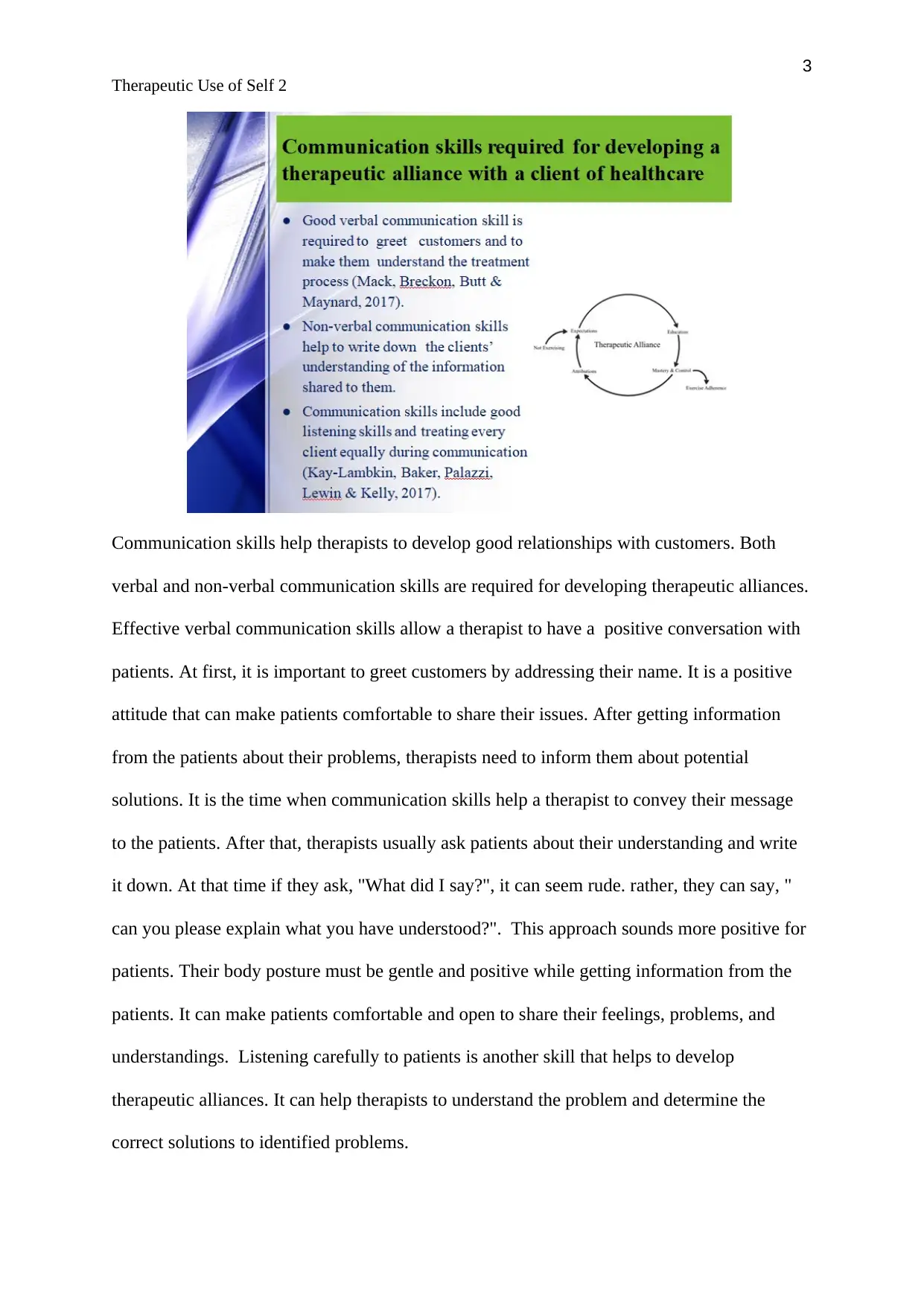
3
Therapeutic Use of Self 2
Communication skills help therapists to develop good relationships with customers. Both
verbal and non-verbal communication skills are required for developing therapeutic alliances.
Effective verbal communication skills allow a therapist to have a positive conversation with
patients. At first, it is important to greet customers by addressing their name. It is a positive
attitude that can make patients comfortable to share their issues. After getting information
from the patients about their problems, therapists need to inform them about potential
solutions. It is the time when communication skills help a therapist to convey their message
to the patients. After that, therapists usually ask patients about their understanding and write
it down. At that time if they ask, "What did I say?", it can seem rude. rather, they can say, "
can you please explain what you have understood?". This approach sounds more positive for
patients. Their body posture must be gentle and positive while getting information from the
patients. It can make patients comfortable and open to share their feelings, problems, and
understandings. Listening carefully to patients is another skill that helps to develop
therapeutic alliances. It can help therapists to understand the problem and determine the
correct solutions to identified problems.
Therapeutic Use of Self 2
Communication skills help therapists to develop good relationships with customers. Both
verbal and non-verbal communication skills are required for developing therapeutic alliances.
Effective verbal communication skills allow a therapist to have a positive conversation with
patients. At first, it is important to greet customers by addressing their name. It is a positive
attitude that can make patients comfortable to share their issues. After getting information
from the patients about their problems, therapists need to inform them about potential
solutions. It is the time when communication skills help a therapist to convey their message
to the patients. After that, therapists usually ask patients about their understanding and write
it down. At that time if they ask, "What did I say?", it can seem rude. rather, they can say, "
can you please explain what you have understood?". This approach sounds more positive for
patients. Their body posture must be gentle and positive while getting information from the
patients. It can make patients comfortable and open to share their feelings, problems, and
understandings. Listening carefully to patients is another skill that helps to develop
therapeutic alliances. It can help therapists to understand the problem and determine the
correct solutions to identified problems.
⊘ This is a preview!⊘
Do you want full access?
Subscribe today to unlock all pages.

Trusted by 1+ million students worldwide
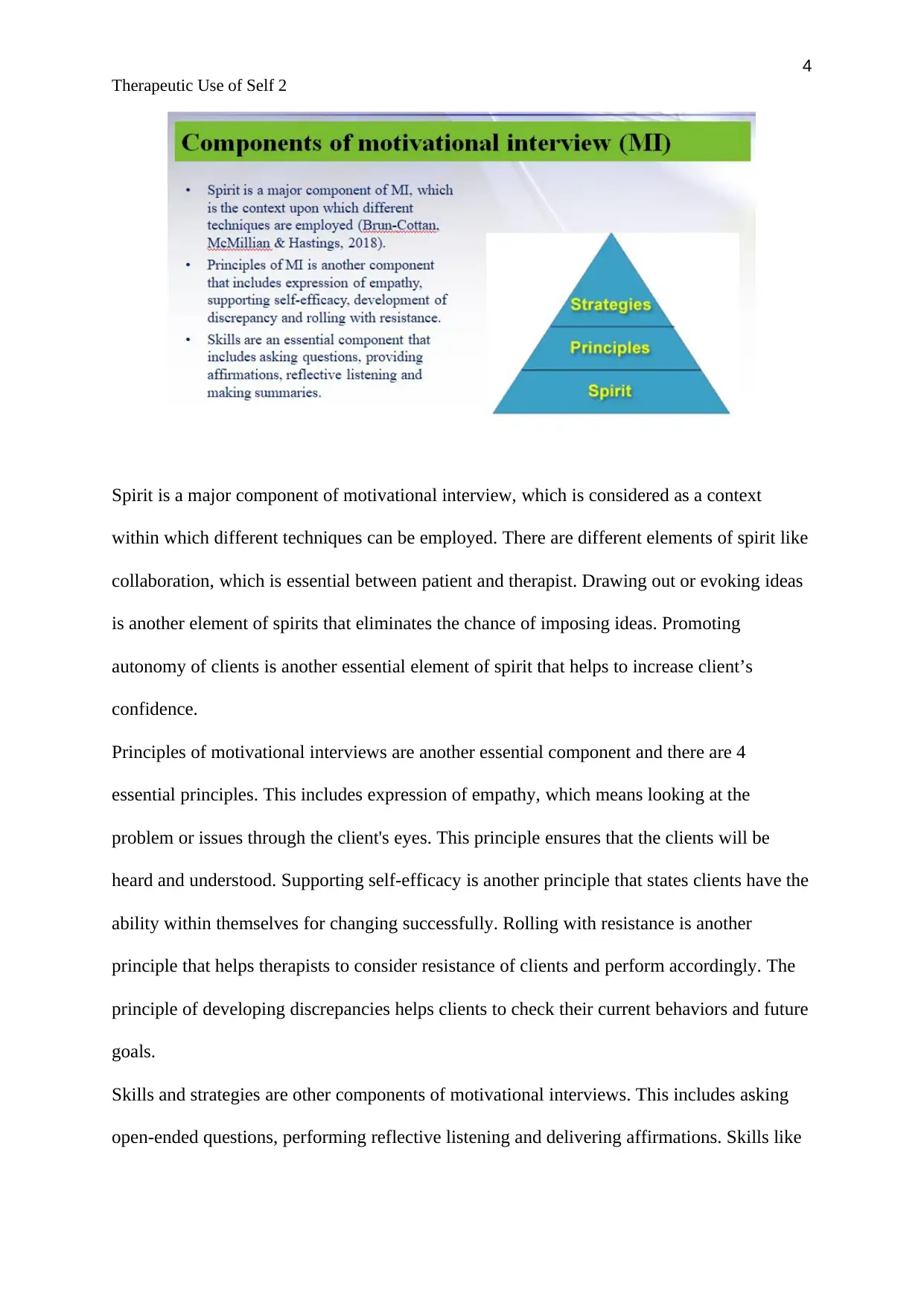
4
Therapeutic Use of Self 2
Spirit is a major component of motivational interview, which is considered as a context
within which different techniques can be employed. There are different elements of spirit like
collaboration, which is essential between patient and therapist. Drawing out or evoking ideas
is another element of spirits that eliminates the chance of imposing ideas. Promoting
autonomy of clients is another essential element of spirit that helps to increase client’s
confidence.
Principles of motivational interviews are another essential component and there are 4
essential principles. This includes expression of empathy, which means looking at the
problem or issues through the client's eyes. This principle ensures that the clients will be
heard and understood. Supporting self-efficacy is another principle that states clients have the
ability within themselves for changing successfully. Rolling with resistance is another
principle that helps therapists to consider resistance of clients and perform accordingly. The
principle of developing discrepancies helps clients to check their current behaviors and future
goals.
Skills and strategies are other components of motivational interviews. This includes asking
open-ended questions, performing reflective listening and delivering affirmations. Skills like
Therapeutic Use of Self 2
Spirit is a major component of motivational interview, which is considered as a context
within which different techniques can be employed. There are different elements of spirit like
collaboration, which is essential between patient and therapist. Drawing out or evoking ideas
is another element of spirits that eliminates the chance of imposing ideas. Promoting
autonomy of clients is another essential element of spirit that helps to increase client’s
confidence.
Principles of motivational interviews are another essential component and there are 4
essential principles. This includes expression of empathy, which means looking at the
problem or issues through the client's eyes. This principle ensures that the clients will be
heard and understood. Supporting self-efficacy is another principle that states clients have the
ability within themselves for changing successfully. Rolling with resistance is another
principle that helps therapists to consider resistance of clients and perform accordingly. The
principle of developing discrepancies helps clients to check their current behaviors and future
goals.
Skills and strategies are other components of motivational interviews. This includes asking
open-ended questions, performing reflective listening and delivering affirmations. Skills like
Paraphrase This Document
Need a fresh take? Get an instant paraphrase of this document with our AI Paraphraser
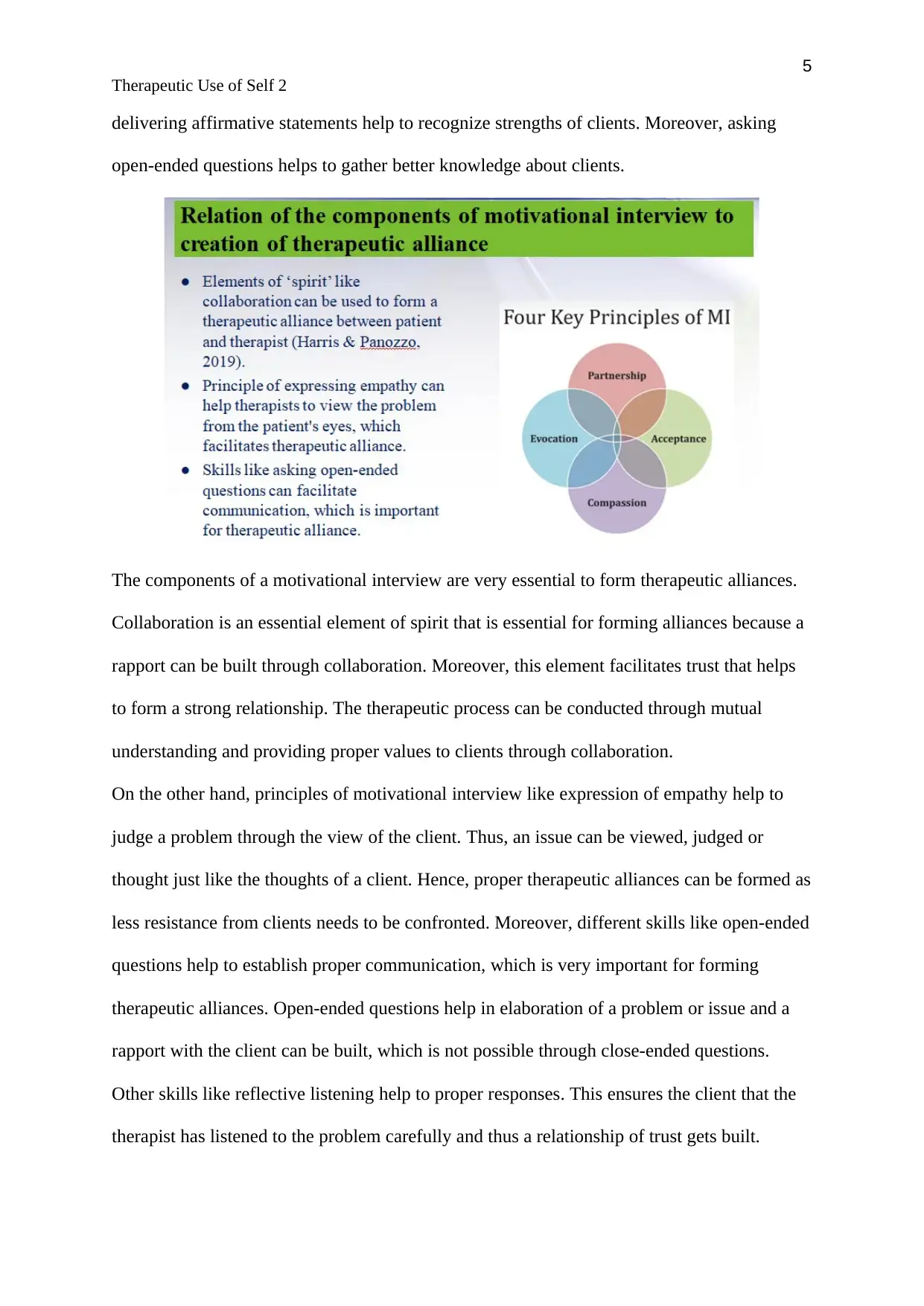
5
Therapeutic Use of Self 2
delivering affirmative statements help to recognize strengths of clients. Moreover, asking
open-ended questions helps to gather better knowledge about clients.
The components of a motivational interview are very essential to form therapeutic alliances.
Collaboration is an essential element of spirit that is essential for forming alliances because a
rapport can be built through collaboration. Moreover, this element facilitates trust that helps
to form a strong relationship. The therapeutic process can be conducted through mutual
understanding and providing proper values to clients through collaboration.
On the other hand, principles of motivational interview like expression of empathy help to
judge a problem through the view of the client. Thus, an issue can be viewed, judged or
thought just like the thoughts of a client. Hence, proper therapeutic alliances can be formed as
less resistance from clients needs to be confronted. Moreover, different skills like open-ended
questions help to establish proper communication, which is very important for forming
therapeutic alliances. Open-ended questions help in elaboration of a problem or issue and a
rapport with the client can be built, which is not possible through close-ended questions.
Other skills like reflective listening help to proper responses. This ensures the client that the
therapist has listened to the problem carefully and thus a relationship of trust gets built.
Therapeutic Use of Self 2
delivering affirmative statements help to recognize strengths of clients. Moreover, asking
open-ended questions helps to gather better knowledge about clients.
The components of a motivational interview are very essential to form therapeutic alliances.
Collaboration is an essential element of spirit that is essential for forming alliances because a
rapport can be built through collaboration. Moreover, this element facilitates trust that helps
to form a strong relationship. The therapeutic process can be conducted through mutual
understanding and providing proper values to clients through collaboration.
On the other hand, principles of motivational interview like expression of empathy help to
judge a problem through the view of the client. Thus, an issue can be viewed, judged or
thought just like the thoughts of a client. Hence, proper therapeutic alliances can be formed as
less resistance from clients needs to be confronted. Moreover, different skills like open-ended
questions help to establish proper communication, which is very important for forming
therapeutic alliances. Open-ended questions help in elaboration of a problem or issue and a
rapport with the client can be built, which is not possible through close-ended questions.
Other skills like reflective listening help to proper responses. This ensures the client that the
therapist has listened to the problem carefully and thus a relationship of trust gets built.
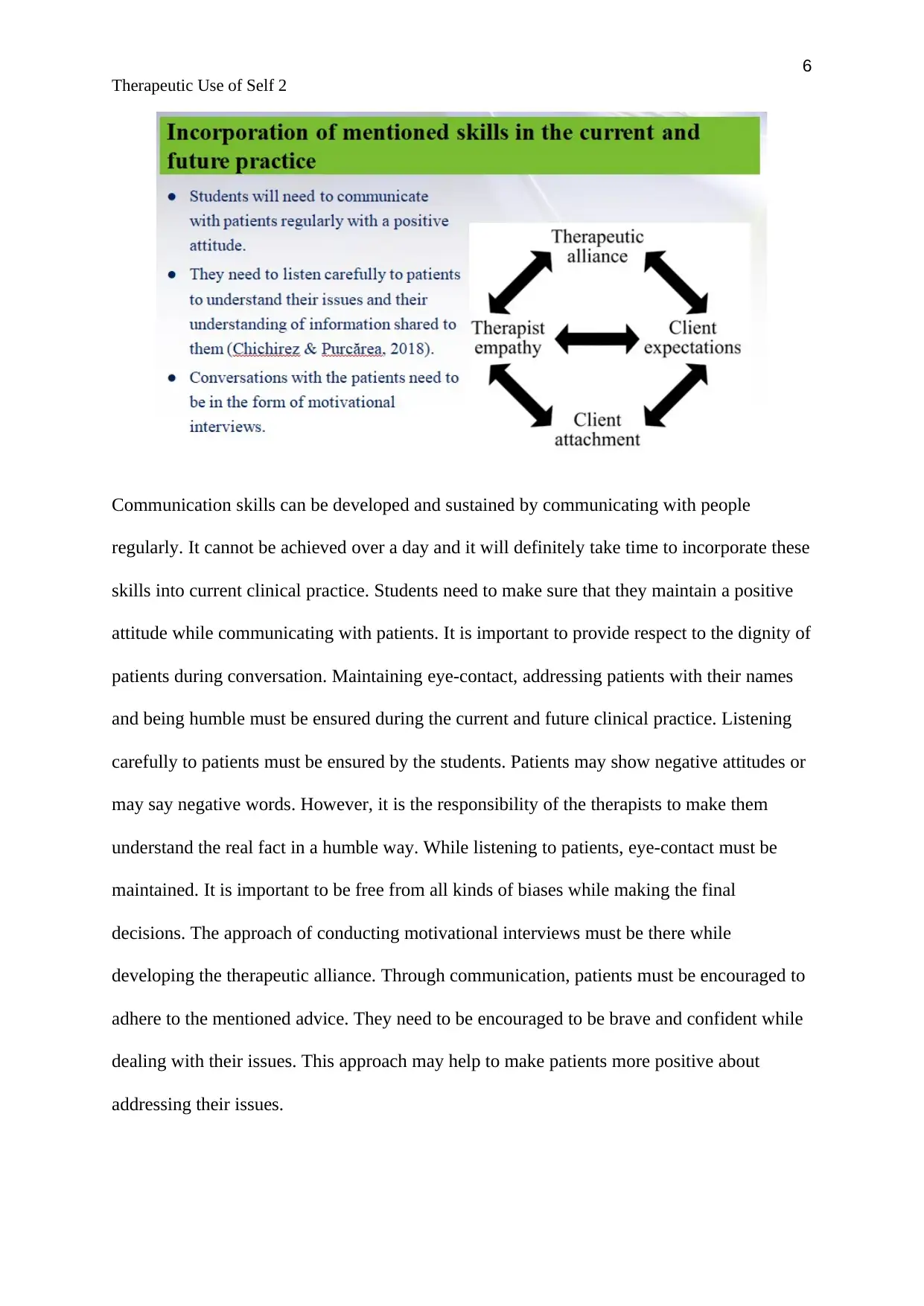
6
Therapeutic Use of Self 2
Communication skills can be developed and sustained by communicating with people
regularly. It cannot be achieved over a day and it will definitely take time to incorporate these
skills into current clinical practice. Students need to make sure that they maintain a positive
attitude while communicating with patients. It is important to provide respect to the dignity of
patients during conversation. Maintaining eye-contact, addressing patients with their names
and being humble must be ensured during the current and future clinical practice. Listening
carefully to patients must be ensured by the students. Patients may show negative attitudes or
may say negative words. However, it is the responsibility of the therapists to make them
understand the real fact in a humble way. While listening to patients, eye-contact must be
maintained. It is important to be free from all kinds of biases while making the final
decisions. The approach of conducting motivational interviews must be there while
developing the therapeutic alliance. Through communication, patients must be encouraged to
adhere to the mentioned advice. They need to be encouraged to be brave and confident while
dealing with their issues. This approach may help to make patients more positive about
addressing their issues.
Therapeutic Use of Self 2
Communication skills can be developed and sustained by communicating with people
regularly. It cannot be achieved over a day and it will definitely take time to incorporate these
skills into current clinical practice. Students need to make sure that they maintain a positive
attitude while communicating with patients. It is important to provide respect to the dignity of
patients during conversation. Maintaining eye-contact, addressing patients with their names
and being humble must be ensured during the current and future clinical practice. Listening
carefully to patients must be ensured by the students. Patients may show negative attitudes or
may say negative words. However, it is the responsibility of the therapists to make them
understand the real fact in a humble way. While listening to patients, eye-contact must be
maintained. It is important to be free from all kinds of biases while making the final
decisions. The approach of conducting motivational interviews must be there while
developing the therapeutic alliance. Through communication, patients must be encouraged to
adhere to the mentioned advice. They need to be encouraged to be brave and confident while
dealing with their issues. This approach may help to make patients more positive about
addressing their issues.
⊘ This is a preview!⊘
Do you want full access?
Subscribe today to unlock all pages.

Trusted by 1+ million students worldwide
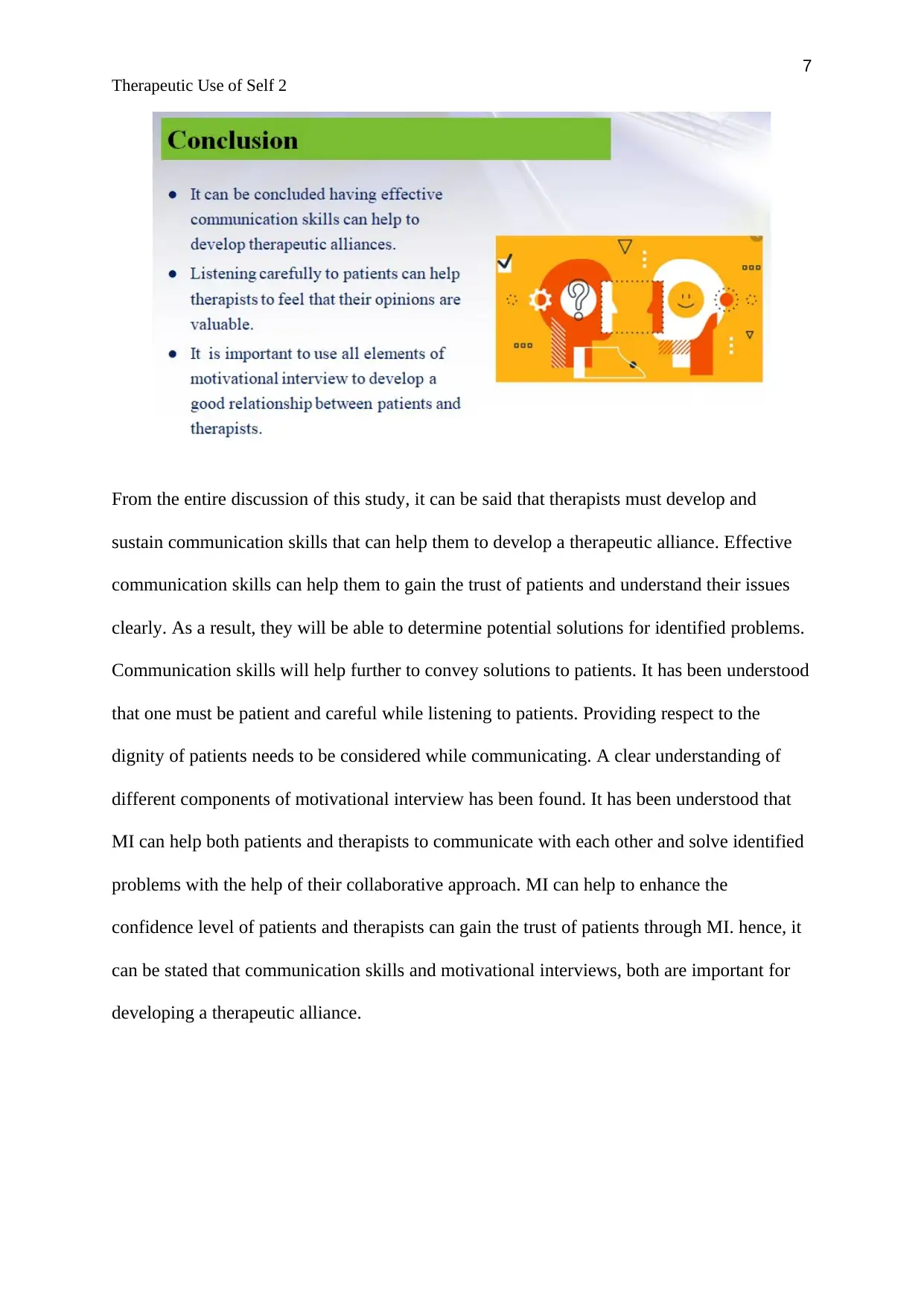
7
Therapeutic Use of Self 2
From the entire discussion of this study, it can be said that therapists must develop and
sustain communication skills that can help them to develop a therapeutic alliance. Effective
communication skills can help them to gain the trust of patients and understand their issues
clearly. As a result, they will be able to determine potential solutions for identified problems.
Communication skills will help further to convey solutions to patients. It has been understood
that one must be patient and careful while listening to patients. Providing respect to the
dignity of patients needs to be considered while communicating. A clear understanding of
different components of motivational interview has been found. It has been understood that
MI can help both patients and therapists to communicate with each other and solve identified
problems with the help of their collaborative approach. MI can help to enhance the
confidence level of patients and therapists can gain the trust of patients through MI. hence, it
can be stated that communication skills and motivational interviews, both are important for
developing a therapeutic alliance.
Therapeutic Use of Self 2
From the entire discussion of this study, it can be said that therapists must develop and
sustain communication skills that can help them to develop a therapeutic alliance. Effective
communication skills can help them to gain the trust of patients and understand their issues
clearly. As a result, they will be able to determine potential solutions for identified problems.
Communication skills will help further to convey solutions to patients. It has been understood
that one must be patient and careful while listening to patients. Providing respect to the
dignity of patients needs to be considered while communicating. A clear understanding of
different components of motivational interview has been found. It has been understood that
MI can help both patients and therapists to communicate with each other and solve identified
problems with the help of their collaborative approach. MI can help to enhance the
confidence level of patients and therapists can gain the trust of patients through MI. hence, it
can be stated that communication skills and motivational interviews, both are important for
developing a therapeutic alliance.
1 out of 7
Related Documents
Your All-in-One AI-Powered Toolkit for Academic Success.
+13062052269
info@desklib.com
Available 24*7 on WhatsApp / Email
![[object Object]](/_next/static/media/star-bottom.7253800d.svg)
Unlock your academic potential
Copyright © 2020–2026 A2Z Services. All Rights Reserved. Developed and managed by ZUCOL.





